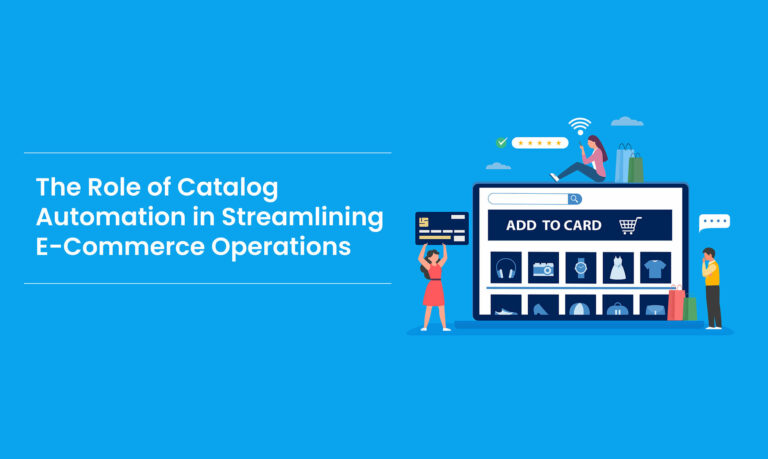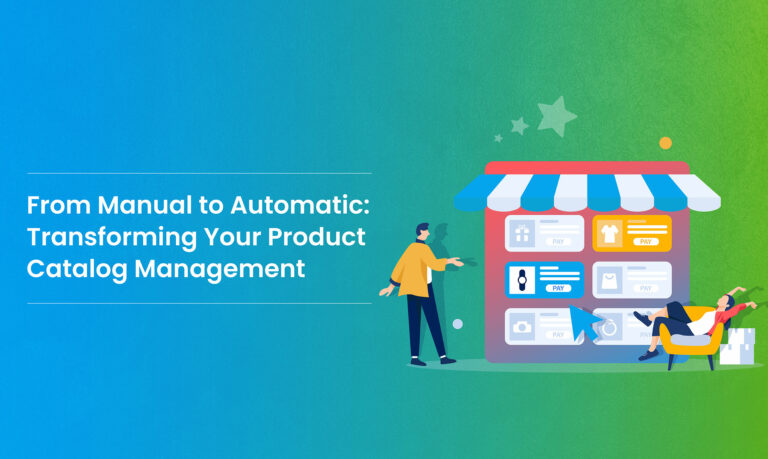Introduction
Businesses continuously seek creative methods to improve efficiency and simplify operations in today’s fast-paced digital world. Catalog automation is one such revolutionary option that has become very popular recently. This blog explores the topic of catalog automation and how it might transform corporate operations, especially those related to e-commerce.
Catalog Automation: What Is It?
The practice of using technology, especially software solutions, to automate the generation, maintenance, and optimization of product catalogs is known as catalog automation. Catalog automation is a complete solution to boost growth and optimize operations in the eCommerce space, where the amount and complexity of product data can be daunting.
Product catalog management used to require manual procedures, such as data input, updates, and platform synchronization. However, because of the development of technologies for catalog automation, companies can now automate these processes, which improves scalability, accuracy, and efficiency.
Simplifying the Management of Product Data
Product data management is revolutionized by catalog automation, which offers a more efficient method of managing large volumes of data. Although manual data entry and updates were formerly common, they now pose serious problems due to their lengthy processing times and high rate of mistakes. Companies frequently need help manually entering product information across several platforms, running the risk of errors and inconsistencies in the process. This manual method is labor-intensive and increases the possibility of inaccuracies entering the catalog.
However, these difficulties are lessened with catalog automation. The procedure is streamlined by automated technologies, which minimizes mistakes and the need for personal involvement. Furthermore, the capacity of automation to synchronize data easily between platforms is one of its main advantages. Businesses can benefit from the efficiency of automatic data synchronization rather than managing different sets of information across many channels. This raises the catalog’s overall caliber and increases client happiness by guaranteeing that product information is accurate and consistent across all touchpoints.
Increasing Accuracy and Efficiency
Efficiency and accuracy in eCommerce processes are accelerated by automation. Businesses may increase productivity by streamlining workflows, lowering mistakes, and substituting automated technologies for manual procedures. The capacity of automation to remove the possibility of human mistakes present in manual activities is one of its main benefits. Businesses may lessen the possibility of mistakes and inconsistencies leaking into the system by using automation to guarantee correct and consistent data entry and changes.
Furthermore, automation has a large time-saving advantage over human techniques, enabling organizations to finish jobs much faster. For instance, with the use of automation technologies, jobs that formerly needed hours of physical labor may now be finished in a matter of minutes. This improves productivity while also freeing up time and resources that may be used for more calculated efforts.
Thanks to automation, businesses may also become more agile and responsive to shifting market conditions. Businesses may respond more swiftly and efficiently to client preferences and market changes by automating repetitive operations like data entry and updating. In the quick-paced eCommerce world of today, where success depends on being one step ahead of the competition, this agility is vital.
Customized Experiences for Customers
In the world of eCommerce, automated catalogs are essential to provide clients with individualized experiences. The incorporation of AI, which powers customized experiences and individualized suggestions, is essential to this. Large volumes of consumer data, including browsing and purchase histories, demographic data, and demographic profiles, are analyzed by AI algorithms to provide insights into the preferences and interests of specific individuals.
Businesses may provide tailored product suggestions and marketing messages by using AI-powered insights to gain a detailed understanding of client preferences. This customized strategy increases consumer loyalty, encourages repeat business, and improves the purchasing experience.
Additionally, automated catalogs let companies use customized product suggestions on email campaigns, mobile applications, and websites, among other touchpoints. Businesses may boost customer engagement and conversion rates by providing timely and appropriate advice, ultimately leading to revenue development.
Growing and Scaling Operations
Automation provides organizations with the flexibility and agility required to handle expansion, and it is the foundation for scalability in eCommerce operations. On the other hand, manual scaling presents several difficulties that frequently lead to inefficiencies and bottlenecks.
Businesses may grow their operations through automation without requiring more equipment or labor. Businesses may expand their operations to meet rising demand thanks to automated systems’ easy handling of ever-increasing data and transaction volumes.
Furthermore, automation facilitates the growth and expansion of businesses by optimizing operations and enhancing operational effectiveness. Businesses may focus on strategic projects that foster development and innovation by automating repetitive operations like data entry and updates.
However, manual scaling in eCommerce has many drawbacks, such as a higher chance of mistakes, longer processing times, and less scalability. Scaling manual processes takes time and money, frequently leading to delays and inefficiencies.
On the other hand, automation makes it possible for companies to increase their operations swiftly and effectively, guaranteeing that they can meet rising demand and seize fresh opportunities for expansion. In conclusion, automation is critical in enabling scalability in eCommerce operations, providing companies with the adaptability and agility required to prosper in today’s fiercely competitive market.
Merging of Machine Learning and Artificial Intelligence
Using AI/ ML and catalog automation to work together has enormous potential in streamlining operational processes within the eCommerce sector, thus spearheading an era of business growth. Applying AI-driven insights ensures massive data analysis for identifying trends, patterns, and client preferences, optimizing the catalog.
Companies’ goals can be achieved when their catalogs are optimized using AI-powered insights. For instance, AI systems can identify popular products based on consumer behavior analysis and preferences. This enables companies to have the ordering and ranking of these products in their catalog.
Companies can also use AI-powered data to perfect their profitability and customer satisfaction offers, inform pricing strategies, and provide input into inventory management decisions. In addition, organizations proactively implement predictive inventories and catalog levels with the help of AI-powered analysis that helps forecast client demand and possible consumer trends.
Resources Allocation and Cost Averting
Organizations also use automation to save much more money besides accuracy and efficiency. Automation reduces operating costs and increases the profit margin with its cost-saving aspect, as manual labor is not required to be hired by an organization, making operations more efficient. For example, automation eliminates the requirement for manual labor-based data validation and modifications that squander precious time and money.
Furthermore, automation saves money, which companies can invest in significant projects such as marketing initiatives undertaken so that, for example, a customer understands what products or goods are available. It also provides the opportunity to develop new and innovative products. Armed with an investment in automation, organizations can discover new avenues for development and uniqueness amid the contended field of eCommerce.
In addition to this, automation reduces costs through the reduction of price optimization and improving inventory control. AI will be able to provide insights that help businesses make strategic inventory decisions and help them curb the loss of resources or earn profits.
Overcoming Challenges and Implementation Tips
1. Handling Common Challenges: Determine possible roadblocks to implementing catalog automation, such as integration difficulties, lack of experience, or opposition to change. To guarantee a seamless shift, acknowledge how critical it is to comprehend these difficulties and take proactive measures to remedy them.
2. Useful Advice for a Smooth Implementation: Start by thoroughly evaluating the current systems and processes to determine which ones benefit most from automation. Make a significant investment in training initiatives to introduce staff members to the new procedures and technologies, guaranteeing broad acceptance and buy-in. Work closely with suppliers or consultants specializing in catalog automation to utilize their experience and knowledge.
3. Training is Important: Stress the value of continual instruction and assistance to ensure staff members are proficient and at ease in utilizing the new automated technologies. Give users access to online discussion boards, user manuals, and tutorials to facilitate lifelong learning.
4. Ongoing Enhancement: Provide systems for continuing observation and assessment to pinpoint areas needing enhancement and streamlining. Seek input from staff members across the board to learn more about leveraging automation and how best to adapt to changing requirements.
Businesses may maximize the effectiveness of their catalog automation projects and realize the full potential of automation to revolutionize their eCommerce operations by tackling common difficulties head-on and putting these helpful ideas into practice.
Conclusion
In summary, thanks to catalog automation, organizations’ management and optimization of product catalogs is about to undergo a paradigm leap. Automation facilitates individualized client experiences, improves productivity and accuracy, and streamlines data management—all of which are highly advantageous for eCommerce enterprises.
Leading the way in streamlining eCommerce cataloging using cutting-edge AI solutions, Rubick.ai is revolutionizing the eCommerce market for merchants and brands. Their all-inclusive platform provides several options: price intelligence, marketplace templates, content creation, and catalog automation. Businesses may use Rubick.ai to leverage AI to expand, improve operations, and outperform rivals in today’s fast-paced eCommerce market.

